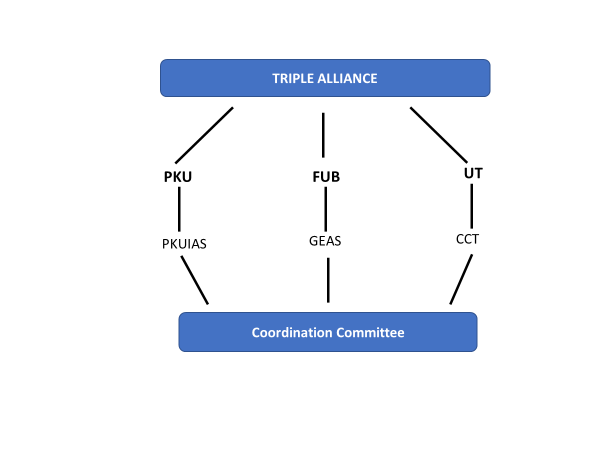Triple Alliance of Peking University (PKU), Freie Universität Berlin (FUB) and University of Tübingen (UT) for Area Studies
Mission Statement
PKU, FUB and UT have agreed to cooperate in the field of area studies with the objective of collaboration in research and teaching, and exchange of staff and graduate students in the field of area studies. For that purpose, the Triple Alliance will establish a number of exchange programs at the faculty and graduate level to
a) support joint research and teaching programs of the highest academic quality in the field of Area Studies;
b) provide international experience for doctoral students of each party that will prepare them for their academic career;
c) create international networks for doctoral students of the three institutions;
d) set up joint summer schools, conferences, and workshops, and
e) host short research visits for doctoral students and faculty at PKU, FUB and UT in each academic year.
Under the auspices of the TA, doctoral students from PKU will spend one or two semesters at UT or FUB. Doctoral students from UT and FUB will spend one or two semesters at PKU. Per year, up to two students from each cooperating institution may take part in the exchange program. Moreover, a faculty and research staff exchange programme is set up for the purpose of research and academic work and participation of conference. In order to cultivate new talent, young researchers will be preferentially nominated for the exchange.
The cooperation between PKU, UT and FUB in the field of area studies will be jointly coordinated and implemented by the Institute of Area Studies at Peking University (PKUIAS), the China Center Tübingen (CCT) in cooperation with the ECCS Office at PKU and the Graduate School of East Asian Studies (GEAS) in cooperation with the FUB Office at PKU. These entities liaise with each other or via the TA’s Coordination Committee in order to run the different programs under the auspices of the TA.
A Coordination Committee is established to facilitate communication between the named entities. The members of the Coordination Committee are nominated by the respective universities. It holds business meetings at regular intervals to finetune the TA’s collaboration, discuss and develop new programme initiatives and solve whatever problem might occur in the work of the TA.

Faculty and doctoral students of all three parties are invited to join the TA’s activities and programmes to build up closely-knit networks of academic collaboration. The TA follows a bottom-up approach and provides, via the mentioned entities, a platform for developing ideas for its activities, like joint research projects, PhD training programs, workshops, summer schools, virtual teaching formats or digital lecture series.


